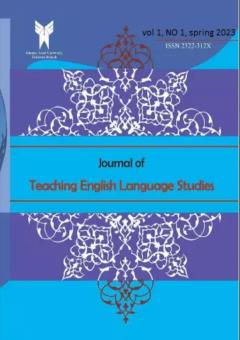Structural Equation Modeling of the Relationship among BFI and Components of IELTS Reading and Speaking Modules among Female Candidates
محورهای موضوعی : Journal of Teaching English Language Studies
Abdolhamid Mohammadi
1
,
Seyyed Ayatollah Razmjoo
2
,
Shahram Afraz
3
![]() ,
Fazlolah Samimi
4
,
Fazlolah Samimi
4
1 - PH.D candidate, Gheshm Branch Islamic Azad University,Gheshm,Iran
2 - Faculty of Foreign Languages, Shiraz University, Shiraz, Iran
3 - Assistant Professor of TEFL, Department of English Language, Qeshm Branch, Islamic Azad University, Qeshm, Iran
4 - Department of English, Bandar-Abbas Branch, Islamic Azad University, Bandar-Abbas, Iran
کلید واژه: Brain-friendly Instruction, IELTS, Reading Scores, Speaking Scores, English as a Foreign Language (EFL),
چکیده مقاله :
The current study investigates the role of Brain-friendly Instruction components namely, Assessment, Motivation, and Instruction in predicting the IELTS reading and speaking scores of female candidates. The present research was conducted with 120 female EFL learners through SEM with Smart PLS. It was found that the components of BFI are positively and significantly related to language proficiency outcomes. Whereas Assessment and Motivation were found to enhance IELTS reading scores significantly, Instruction was considered the most critical factor affecting speaking scores. From this, it is clear that to consider brain-friendly pedagogical practices, students' cognitive and emotional needs will have to be taken into account. The current study contributes to the existing literature pool with empirical data related to BFI effectiveness within language education. It points out the need for educators to inculcate such principles into their instructional strategies. In this direction, the creation of a nonthreatening learning environment, along with the implementation of proper assessment tools, will significantly improve the language output, especially for female learners who experience very particular problems when learning in EFL settings. The implications of this study are, therefore, useful in informing the practice of language professionals, curriculum developers, and researchers interested in the improvement of English proficiency using innovative instructional approaches. Further research is recommended to establish how far BFI principles can be generalized across different educational contexts and learner profiles to consolidate the findings presented here.
The current study investigates the role of Brain-friendly Instruction components namely, Assessment, Motivation, and Instruction in predicting the IELTS reading and speaking scores of female candidates. The present research was conducted with 120 female EFL learners through SEM with Smart PLS. It was found that the components of BFI are positively and significantly related to language proficiency outcomes. Whereas Assessment and Motivation were found to enhance IELTS reading scores significantly, Instruction was considered the most critical factor affecting speaking scores. From this, it is clear that to consider brain-friendly pedagogical practices, students' cognitive and emotional needs will have to be taken into account. The current study contributes to the existing literature pool with empirical data related to BFI effectiveness within language education. It points out the need for educators to inculcate such principles into their instructional strategies. In this direction, the creation of a nonthreatening learning environment, along with the implementation of proper assessment tools, will significantly improve the language output, especially for female learners who experience very particular problems when learning in EFL settings. The implications of this study are, therefore, useful in informing the practice of language professionals, curriculum developers, and researchers interested in the improvement of English proficiency using innovative instructional approaches. Further research is recommended to establish how far BFI principles can be generalized across different educational contexts and learner profiles to consolidate the findings presented here.
Alavi, S. M., & Mansoori, S. (2019). The impact of supportive teaching methods on IELTS speaking performance. Journal of Language and Education, 5(1), 23-35. https://doi.org/10.17323/jle.2019.23.1.23-35
Alderson, J. C. (2017). Assessing reading. Cambridge University Press.
Byrne, B. M. (2010). Structural equation modeling with AMOS: Basic concepts, applications, and programming (2nd ed.). Routledge. https://doi.org/10.4324/9780203843280
Caine, R. N., & Caine, G. (2011). Natural learning for a connected world: Education, technology, and the human brain. Teachers College Press.
Deci, E. L., & Ryan, R. M. (2017). Self-determination theory: Basic psychological needs in motivation, development, and wellness. Guilford Press.
Dörnyei, Z., & Ushioda, E. (2017). Motivation, language identity and the L2 self. Multilingual Matters.
IELTS. (2023). IELTS speaking and reading test format. https://www.ielts.org
Jensen, E. (2008). Brain-based learning: The new paradigm of teaching (2nd ed.). Corwin Press.
Kline, R. B. (2015). Principles and practice of structural equation modeling (4th ed.). The Guilford Press. https://doi.org/10.1521/978.14625/9781462534615
Li, H., Zhang, X., & Zhao, Y. (2019). The impact of brain-friendly instruction on English speaking skills: A study of EFL learners in China. Journal of Language Teaching and Research, 10(4), 783790. https://doi.org/10.17507/jltr.1004.14
Moghaddas, B., & Ghafournia, N. (2017). The effect of brain-based instruction on EFL learners’ reading comprehension. Journal of Applied Linguistics and Language Research, 4(6), 76-85. https://doi.org/10.21283/23769130.4.6.76
Oxford, R. L., & Ehrman, M. E. (1995). Adults' language learning strategies in an intensive foreign language program in the United States. System, 23(3), 359-386. https://doi.org/10.1016/0346-251X(95)00028-O
Pavlenko, A., & Piller, I. (2008). Language education and gender. In N. Hornberger (Ed.), Encyclopedia of language and education (2nd ed., Vol. 10, pp. 57-69). Springer. https://doi.org/10.1007/978-0-387-30424-3_6
Rahimi, M., & Katal, M. (2012). The impact of learning style preferences on Iranian EFL learners' IELTS reading performance. Language Learning Journal, 40(2), 172-182. https://doi.org/10.1080/09571736.2012.655925
Riasati, M. J., & Rahimi, M. (2018). The impact of brain-based teaching on EFL learners' motivation and academic achievement. Applied Research on English Language, 7(2), 217-234. https://doi.org/10.22111/arele.2018.3917
Riazi, A. M., & Ranjbar, A. (2018). The effect of formative assessment on EFL learners’ reading comprehension. Iranian Journal of Language Testing, 8(2), 121140. https://doi.org/10.29252/ijlt.8.2.121
Sousa, D. A. (2011). How the brain learns (4th ed.). Corwin Press.
Tseng, Y. (2020). The relationship between motivation and speaking proficiency in EFL learners. Asian EFL Journal, 27(2), 136155.


